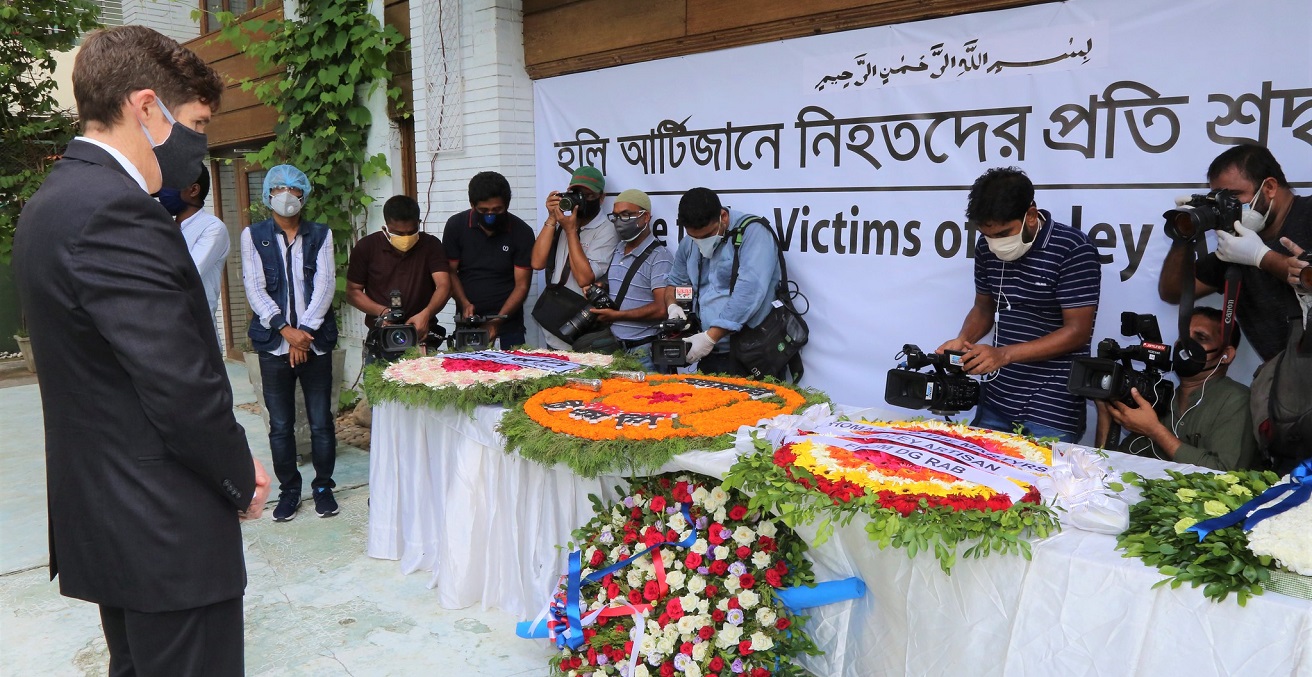The Hidden Toll of Casting Off Islamist Militancy

Following the horrific 9/11 attacks, the “war on terror” was the utmost national security priority for the United States. Under President Joe Biden, Washington’s national security priorities are witnessing a new paradigm shift.
The “war on terror” era, which debunked the grand illusion of the “end of history” with the triumph of the US-led international order — as prophesied by American Political Scientist Francis Fukuyama — has now come to an end with the shifting security priorities of the Biden administration. After 20 years, Biden is taking steps to move the country into the uncharted waters of a new period of history: the post-post-9/11 era.
The Biden administration’s Interim National Security Strategy Guidance is profoundly influenced by two components — intensified geopolitical confrontation with an assertive China and a revanchist Russia on the one hand, and the restoration of US global leadership on issues such as human rights, democracy, and climate change, on the other hand. However, what makes Biden’s approach precarious is the diminished focus on the “old” security priority of his last three predecessors — Islamist militancy.
South Asia In The Post-Post-9/11 Era
Although al-Qaeda and the Islamic State (IS) are reduced to skeletons in the lands in which they were once in power, the Islamist terrorist groups have persisted in the face of tremendous pressure. IS, al-Qaeda, and their various affiliates remain active in the civil wars and turbulent regions around the Muslim world.
Today, the Islamist terrorist movements are attempting to make spaces in multiple smaller safe havens, though none has become as productive as pre-9/11 Afghanistan in breeding terrorism. Nevertheless, IS, al-Qaeda, their affiliates, and homegrown Islamist militants are alive in the turbulent zones of Afghanistan, Pakistan, India, and Bangladesh. It is possible that the US withdrawal from Afghanistan could restore al-Qaeda’s ability to train, plot, and recruit in the country. Under the direction and influence of the Taliban, the “graveyards of empires” might once again become a safe haven for al-Qaeda, IS, or other militant groups to export Islamist militancy to revive the global jihad.
The recent surge of Islamist militancy in Indian-administered Kashmir echoes the haunting memories of the 1990s, when Islamist militancy in the region was at its peak. Both the Taliban’s takeover of Afghanistan and Indian Prime Minister Narendra Modi’s “Hindutva” card have contributed to the rise of foreign militants in Kashmir for the first time since Modi scrapped Jammu and Kashmir’s autonomy status in 2019. In addition, Islamist militancy also soared in Pakistan after the Taliban resurgence in Afghanistan in August 2021.
In the context of Washington’s shifting priorities towards Bangladesh, the Rapid Action Battalion (RAB) and its top officials — once the honeymoon partner of the US with shared security priorities to counter militancy — find themselves swimming against the tide of US sanctions over gross human rights violations and extra-judicial killings. Despite the recent controversies surrounding the RAB, the paramilitary group spearheaded counterterrorism efforts against homegrown and transnational militants and has played an instrumental role in countering Islamist militancy in Bangladesh. The sanctions against RAB are likely to inflict a tremendous blow to the national security apparatus of Bangladesh, as the unit is largely dependent on the US training, equipment, and support. These security concerns further aggrieved Bangladesh as it witnessed the recent surge of militant activities in the Rohingya camps on its soil.
Old Threats, New Threats
The Biden administration must not overshadow the “old” security priorities for the countries of South Asia, where the threat of Islamic militancy is still very real. The profound long-term fallout from these “old threats” may push the South Asian countries toward the geopolitical orbit of China, which the Biden administration deems as a “new threat.” The fusion of old threats and new threats is manifested by the recent bonhomie between the Taliban’s Afghanistan and Xi Jinping’s China, despite the critical challenges that must be navigated in the forthcoming months. As the costs of the post-9/11 era have been staggering, the American approach needs a strategic correction, not a complete change of course.
Although each of Washington’s renewed security preferences has its own justification, it would be a strategic folly to focus on just the “new” threats. This strategic myopia could unravel the “old” threats, including another surge of Islamist terrorist waves, political instabilities, and geopolitical setbacks that would hinder US interests in the future. Although the US has failed in many of its more ambitious efforts to fight Islamist militancy, it still must continue to bolster its counterterrorism efforts with local partners because Islamist militancy isn’t going away from the South Asian region anytime soon.
To avoid the unintended consequences, Washington must maintain a fine balance between the old and new security threats. Certainly, the US needs to prioritise the containment of China and Russia, the restoration of American leadership on human rights and democracy and combatting climate change. However, it must not discard the American counterterrorism toolkit that keeps militant groups weaker and off-balance in the South Asian region. As a resurgence of militancy looms in South Asia, the Biden administration should continue to train and equip local forces and allied partners that can act as spearheads to counter Islamist militancy in this region.
Washington will need to pay considerable attention to the broader contextual, social, and political issues of the region to predict and evaluate the changing nature of Islamic militancy. Therefore, a more robust and proactive strategy is central for US to counter Islamic militancy in South Asia.
Hassan Ahmed Shovon is a Research Assistant at Central Foundation for International and Strategic Studies, Bangladesh. His research interests include security studies, foreign policy and diplomacy, international peace and conflict resolution, political theories and political economy. He holds Bachelor’s and Master’s degrees in International Relations from University of Dhaka, Bangladesh. He can be reached at josephiteshovon10@gmail.com.
This article is published under a Creative Commons Licence, and may be republished with attribution.





